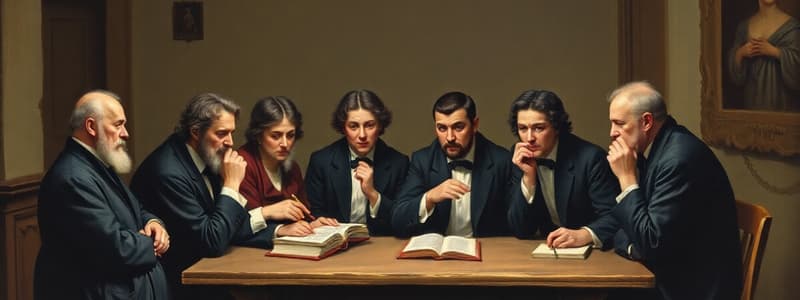Podcast
Questions and Answers
Which Act currently governs the role of juries in England?
Which Act currently governs the role of juries in England?
- Civil Procedure Act 1997
- Juries Act 1974 (correct)
- Criminal Justice Act 1988
- Judicial Review Act 2000
Why can the constitutional position of the English jury be considered vulnerable?
Why can the constitutional position of the English jury be considered vulnerable?
- It is not protected by an unwritten constitution
- It is subject to judicial discretion
- It can be easily amended by Parliament (correct)
- It is governed by a single case law precedent
What is one of the vital roles of the jury in the criminal justice system?
What is one of the vital roles of the jury in the criminal justice system?
- To ensure politicians cannot misuse the justice system (correct)
- To create laws governing jury selection
- To appoint judges in criminal cases
- To decide on legal precedents
What is the main function of the jury during a trial?
What is the main function of the jury during a trial?
In which court are 'indictable only' offences tried?
In which court are 'indictable only' offences tried?
What percentage of criminal cases are typically heard in magistrate's courts?
What percentage of criminal cases are typically heard in magistrate's courts?
What is a significant reason why defendants may prefer to be tried in the Crown Court?
What is a significant reason why defendants may prefer to be tried in the Crown Court?
Which of the following offences does not qualify for a jury trial according to the Supreme Court Act 1981?
Which of the following offences does not qualify for a jury trial according to the Supreme Court Act 1981?
Which of the following is NOT a disqualification for jury service?
Which of the following is NOT a disqualification for jury service?
What significant change occurred in the jury selection process after 2000?
What significant change occurred in the jury selection process after 2000?
Which option describes the consequence of abolishing the peremptory challenge for the defense?
Which option describes the consequence of abolishing the peremptory challenge for the defense?
What is the standard set by the House of Lords for challenging a juror based on bias?
What is the standard set by the House of Lords for challenging a juror based on bias?
What is a potential reason for a judge to discharge a juror during a trial?
What is a potential reason for a judge to discharge a juror during a trial?
Why has the right of the prosecution to stand by a juror been considered controversial?
Why has the right of the prosecution to stand by a juror been considered controversial?
Flashcards are hidden until you start studying
Study Notes
The English Jury System
- The jury system, likely imported after the Norman Conquest, has transitioned from reporting on events to deliberating on evidence.
- The English jury system is considered fundamental, despite a small number of cases being tried by jury.
- The right to trial by jury is not constitutionally enshrined, making it vulnerable to alteration.
- The Juries Act 1974 governs the current jury system.
Jury Functions
- Determining the true facts of a case based on evidence.
- Applying the law, presented by the judge, to the facts.
- Deciding on sentences in criminal cases or awarding damages in civil cases.
Types of Criminal Offenses
- Summary offenses: Minor, less serious offenses tried in magistrates' courts.
- Indictable offenses: Most serious offenses tried in the Crown Court.
- Triable either way offenses: Can be tried in magistrates' courts or the Crown Court, with the defendant having the right to choose the Crown Court.
Jury Involvement in Criminal Cases
- Juries are involved in a small minority of criminal cases.
- Magistrates' courts handle 95% of cases, where juries have no role.
- Juries decide approximately 1% of criminal cases, which are the most serious.
- This 1% equates to around 30,000 trials.
- Research suggests a perception of higher acquittal rates in jury trials than in magistrate's courts.
Erosion of Jury Trials
- The government has attempted to reduce the use of juries to save money.
- The Criminal Law Act of 1977 decreased jury trials by making most driving offenses and minor criminal damage cases summary offenses.
- The Criminal Justice Act of 2003 allows trials by judge alone in instances of serious risk of jury tampering or cases with complex financial and commercial arrangements.
Jury Trials in Civil Cases
- The use of juries in civil cases has declined since the mid-19th century.
- The Supreme Court Act of 1981 grants a qualified right to jury trial in limited cases: libel and slander, malicious prosecution, false imprisonment, and fraud.
Jury Eligibility and Selection
- Eligibility for jury service has broadened to include anyone registered on the electoral register, aged 18-70, resident in the UK for at least five years since age 13, with exceptions for certain professions and individuals with criminal convictions or mental illness.
- Jurors are randomly selected from the electoral register.
Jury Selection Process
- A Central Summoning Bureau at Blackfriars Crown Court is responsible for selecting jurors nationally using a computer system.
- Prospective jurors receive summonses to attend court.
- A jury panel is formed from the summoned individuals.
- Twelve jurors are selected through a ballot in open court.
Jury Challenges
- Peremptory challenges, allowing the defense to exclude jurors without cause, were abolished in 1988.
- The prosecution retains the right to "stand by" jurors, deferring their decision to exclude until needed.
- Challenges for cause, based on ineligibility, disqualification, or bias, are available to both sides.
Jury Vetting
- The practice of jury vetting emerged in 1978, involving checks against police and security service records.
- Authorized checks, permitted in national security and terrorism cases, require the Attorney General's consent.
- The prosecutor can request a juror to "stand by" if information revealed through vetting raises concerns.
Discharging Jurors
- Judges can discharge jurors for reasons such as language difficulties, physical disability, illiteracy, or bias.
- If a juror becomes ill or biased during the trial, they can be disqualified.
- The judge can discharge the entire jury if tampering or an inability to reach a fair verdict is evident.
Judge's Role in Jury Trials
- Judges can direct acquittal if the prosecution evidence is too weak.
- Judges assist juries by intervening during testimony and clarifying legal concepts in their summing up.
Judicial Pressure on Juries
- Unacceptable pressure or influence on juries due to potential threats, violence, intimidation, or bribery can result in a conviction being quashed on appeal.
- Communication between judges and juries during trials should be open and impartial to maintain fairness.
Jury Verdict
- Jury verdicts are ideally unanimous.
- Majority verdicts of ten to two or nine to one are permitted, but the judge may direct the jury to consider a majority verdict if a unanimous verdict is not reached after a reasonable period.
Secrecy of the Jury Room
- Jury deliberations are conducted in secret, and their verdict is final, without justification or explanation.
Jury Deliberation Prohibition
- The Contempt of Court Act 1981, section 8(1) prohibits the disclosure of jury deliberations.
- Disclosing, soliciting, or obtaining information about jury discussions, opinions, arguments, or votes is considered contempt of court and an offense.
- This prohibition includes indirect disclosure, even from third parties, as established in Attorney-General v Associated Newspapers Limited.
Jury Isolation and Communication
- Once a jury retires to deliberate, they are isolated from outside influence and must only communicate with the judge or a designated court officer.
- If a jury sends a note to the judge during deliberations, the judge must disclose the note's contents to both counsels, reconvene the court, and invite submissions.
- Judges must not give directions to the jury through a court clerk; they must recall the jury for direct communication.
Jury Verdict and Research
- The jury verdict is final and unchallengeable on appeal, meaning the Court of Appeal will not accept evidence of jury room discussions.
- While the Royal Commission on Criminal Justice (1993) suggested amending section 8 to permit academic research, this proposal was never implemented.
- Arguments against amending the law include concerns about exposing juries to scrutiny, potentially highlighting weaknesses and undermining public confidence in their role.
Advantages of Jury System
- Trial by jury has been lauded for promoting citizen participation in the justice system.
- It is seen as a safeguard for citizens against potential government or judicial bias.
- The jury system provides a check on the power of the state.
Disadvantages of Jury System
- Critics argue that juries are prone to biases and prejudice.
- There are concerns about the ability of jurors to understand complex legal matters.
- The system can be time-consuming and expensive.
Studying That Suits You
Use AI to generate personalized quizzes and flashcards to suit your learning preferences.





